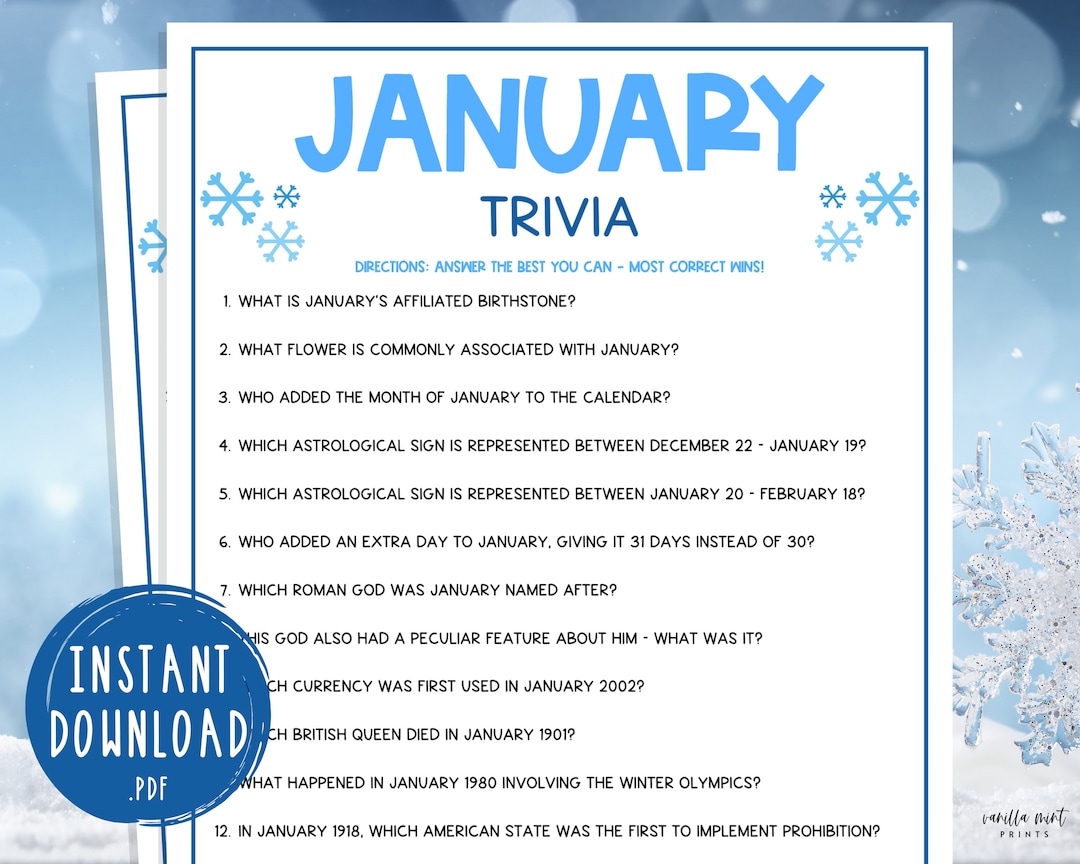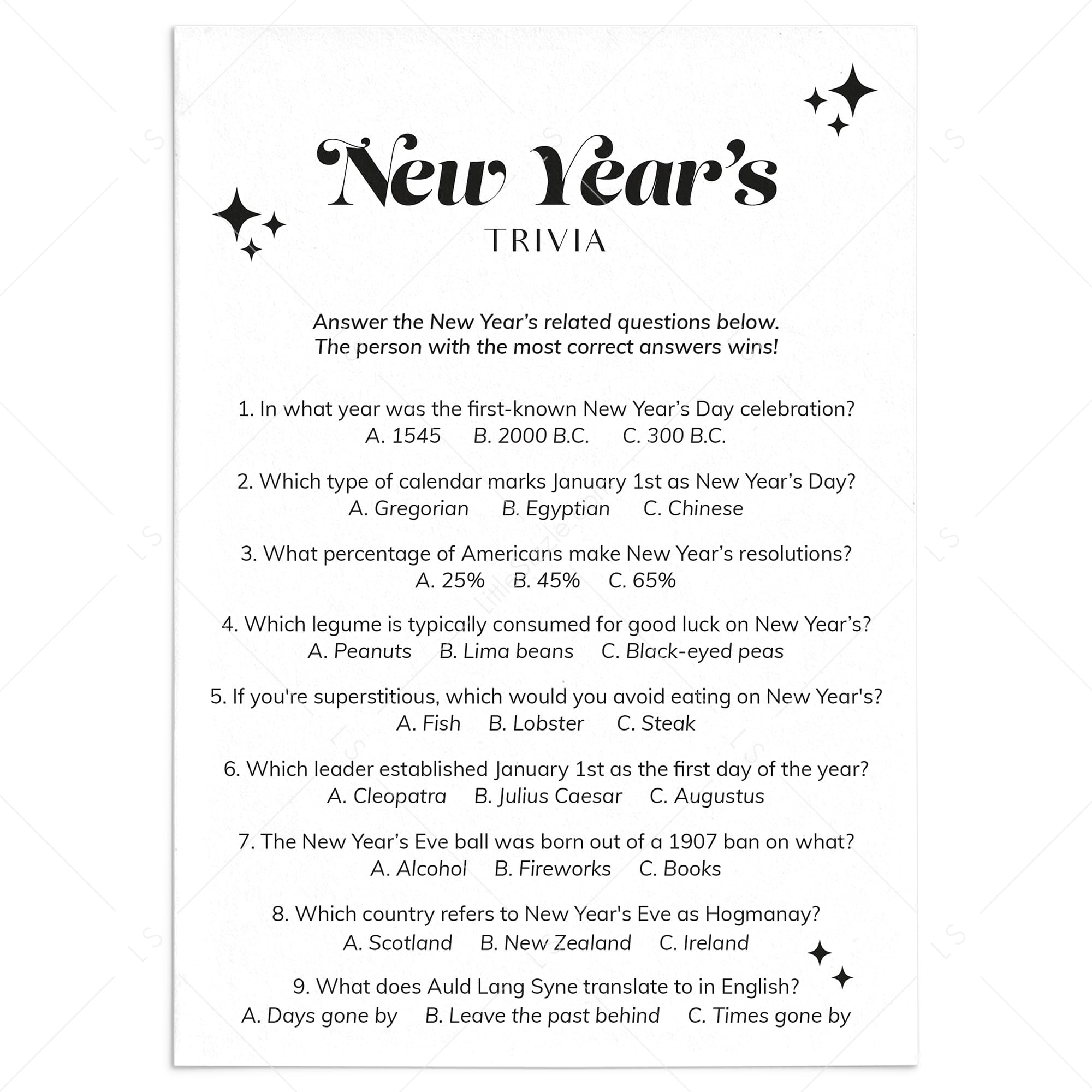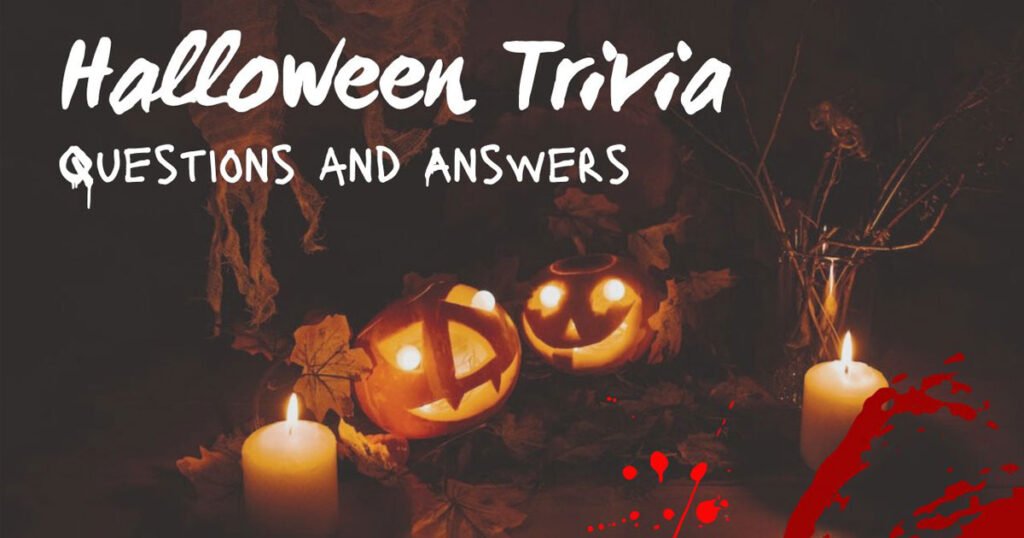January Trivia Questions And Answers: January is named after Janus, the Roman god of doors and gates. It is the first month of the Gregorian calendar.
January marks the beginning of a new year and is filled with historical events and celebrations. Named after Janus, the Roman god of beginnings, January symbolizes new starts. Many people around the world make New Year’s resolutions during this month.
Significant days in January include New Year’s Day on January 1st, Martin Luther King Jr. Day in the United States, and Australia Day on January 26th. This month is also known for being the coldest in the Northern Hemisphere, often bringing snow and winter sports. January trivia questions can spark interesting discussions and bring awareness to the month’s rich history and cultural significance.
January Origins
Ever wondered about the origins of January? Dive into the fascinating world of January trivia questions and answers. Understanding January’s origins can add a whole new level of appreciation to this chilly month. Let’s explore its historical significance and etymology.
Historical Significance
January has a rich historical significance. It marks the beginning of the new year in the Gregorian calendar. Celebrations and traditions across the globe make it a unique month.
Here are some key historical events linked to January:
- New Year’s Day: Celebrated on January 1st, it symbolizes new beginnings.
- Martin Luther King Jr. Day: Celebrated on the third Monday of January in the United States.
- Australia Day: Celebrated on January 26th, it marks the arrival of the First Fleet in 1788.
Many cultures have their own January traditions:
| Country | Tradition |
|---|---|
| Scotland | Hogmanay |
| China | Chinese New Year (varies, sometimes in January) |
| Russia | Orthodox Christmas (January 7th) |
These events and traditions underscore January’s role as a month of renewal and reflection. Understanding these can make your trivia night more engaging and informative.
Etymology
The word “January” has intriguing roots. It originates from the Latin word “Ianuarius”, named after the Roman god Janus.
Janus is the god of beginnings, gates, transitions, time, duality, doorways, passages, and endings. He is often depicted with two faces. One face looks to the past, and the other looks to the future.
Here’s a breakdown of the etymology:
- Latin: Ianuarius
- Roman God: Janus
Janus was a fitting symbol for the start of the year. He represents the transition from the old year to the new year. The Romans believed Janus could see into the future and the past, making him a powerful symbol for January.
Understanding the etymology of January can make your trivia sessions more interesting. It provides a glimpse into ancient beliefs and how they shape our modern calendar.

Credit: www.etsy.com
90 January Trivia Questions And Answers
Here’s a collection of 101 trivia questions and answers for January, organized by category:
New Year’s Celebrations
Q: In what city is the famous ball drop on New Year’s Eve held?
A: New York City (Times Square).
Q: Which country is the first to celebrate the New Year each year?
A: Kiribati.
Q: What is the name of the calendar most countries use today to mark New Year’s?
A: The Gregorian calendar.
Q: What fruit is traditionally eaten in Spain to celebrate the New Year?
A: Grapes.
Q: What flower symbolizes the Chinese New Year?
A: Plum blossom.
Q: What is the Scottish term for New Year’s Eve celebrations?
A: Hogmanay.
Q: Which country celebrates New Year’s Eve by eating 12 grapes at midnight?
A: Spain.
Q: In what country do people wear red underwear on New Year’s Eve for good luck?
A: Italy.
More Trivia
Q: What zodiac animal represents the Chinese New Year in 2024?
A: Dragon.
Q: Which U.S. state drops a giant potato for New Year’s Eve?
A: Idaho.
Q: In Japan, what is the name of the traditional noodle dish eaten on New Year’s Eve?
A: Toshikoshi soba.
Q: In which year did the first ball drop occur in Times Square?
A: 1907.
Q: What day is known as “New Year’s Day” in the Western world?
A: January 1st.
Q: In what country is New Year’s Eve referred to as “Sylvester”?
A: Germany.
Q: Which Asian country celebrates the Lunar New Year with a dragon dance?
A: China.
Q: What do people in Denmark traditionally jump off at midnight on New Year’s Eve?
A: Chairs.
Q: In what country is water thrown from balconies on New Year’s Eve to symbolize purification?
A: Puerto Rico.
Q: What color do people traditionally wear in Brazil to welcome the New Year?
A: White.
Q: In which year did the Julian calendar get replaced by the Gregorian calendar in most of Europe?
A: 1582.
Q: Which U.S. state celebrates New Year’s Eve by dropping a peach?
A: Georgia.
January Holidays and Observances
Q: What day is Martin Luther King Jr. Day observed in the United States?
A: The third Monday of January.
Q: What national day is celebrated in Australia on January 26th?
A: Australia Day.
Q: What day marks the Epiphany in many Christian traditions?
A: January 6th.
Q: What Scottish poet’s life is celebrated on January 25th with “Burns Night”?
A: Robert Burns.
Q: What is the name of the feast celebrating the arrival of the Three Wise Men?
A: Three Kings’ Day or Epiphany.
Q: On which date is National Puzzle Day observed?
A: January 29th.
Q: What day in January is celebrated as National Spaghetti Day?
A: January 4th.
Q: When is National Hat Day celebrated in the United States?
A: January 15th.
Q: What is celebrated on January 20th in the U.S. if it’s an election year?
A: Inauguration Day.
Q: Which holiday marks the end of the 12 days of Christmas?
A: Epiphany (January 6th).
Q: What is celebrated on January 21st in the United States?
A: National Hugging Day.
Q: What day in January is known as National Hot Chocolate Day?
A: January 31st.
Q: What animal is associated with Groundhog Day, which is celebrated in February but often prepared for in January?
A: Groundhog.
Q: Which Christian observance is celebrated on January 1st?
A: The Solemnity of Mary, Mother of God.
Q: What global day of celebration is on January 24th, which celebrates reading and writing?
A: National Compliment Day.
Famous Birthdays in January
Q: What famous musician, known as the “King of Rock and Roll,” was born on January 8th?
A: Elvis Presley.
Q: Which First Lady of the United States, known for her work in human rights, was born on January 17th?
A: Michelle Obama.
Q: What famous scientist, known for his theory of evolution, was born on January 12th?
A: Charles Darwin.
Q: Which civil rights leader, known for his “I Have a Dream” speech, was born on January 15th?
A: Martin Luther King Jr.
Q: What legendary boxer was born on January 17th, 1942?
A: Muhammad Ali.
Q: Which famous actor, known for his role in “Die Hard,” was born on January 13th?
A: Liam Hemsworth.
Q: What American author, known for writing “The Catcher in the Rye,” was born on January 1st?
A: J.D. Salinger.
Q: Which world-renowned physicist, famous for his theory of relativity, was born on January 14th?
A: Stephen Hawking.
Q: What famous fashion designer, known for creating the “New Look,” was born on January 21st?
A: Christian Dior.
Q: Which English author of “Frankenstein” was born in January?
A: Mary Shelley.
Q: Which famous actor known for “Batman” was born on January 19th?
A: Michael Keaton.
Q: What English author, famous for “Pride and Prejudice,” has her birthday observed in January?
A: Jane Austen.
Q: What actor, known for playing Captain Kirk in “Star Trek,” was born on January 20th?
A: William Shatner.
Q: What famous basketball player, born on January 17th, won 5 NBA championships?
A: Dwyane Wade.
Q: What historical figure, known for his voyages to the Americas, was born on January 25th?
A: Christopher Columbus.
January Sports Events
Q: What tennis tournament, one of the four Grand Slam events, begins in January?
A: The Australian Open.
Q: Which team sport’s season typically ends in January with its championship games in the NFL?
A: Football.
Q: What is the name of the major golf tournament held in Hawaii in January?
A: The Sony Open.
Q: Which winter sports competition is held annually in January in Aspen, Colorado?
A: Winter X Games.
Q: What race in the Iditarod trail begins in January?
A: Yukon Quest.
Q: Which country typically hosts the Dakar Rally that starts in January?
A: Saudi Arabia (recent years).
Q: In what year was the first Super Bowl held in January?
A: 1967.
Q: What NBA event usually occurs in January?
A: NBA All-Star voting begins.
Q: The National Championship in which college sport is often held in January in the U.S.?
A: College Football (CFP Championship).
Q: Which skiing competition takes place in Austria in January?
A: Hahnenkamm Races.
Q: In which country is the annual cricket series “Big Bash League” played in January?
A: Australia.
Q: Which major marathon is held in Disney World in January?
A: Walt Disney World Marathon.
Q: What month does the NHL Winter Classic typically take place?
A: January.
Q: What team won the 2022 NFL Super Bowl held in January?
A: The Los Angeles Rams.
Q: In what month is the Daytona 500 held, marking the start of the NASCAR season?
A: February (January practices and qualifiers).
Winter and January-Related Facts
Q: January is named after which Roman god?
A: Janus.
Q: What is the birthstone for January?
A: Garnet.
Q: What is the birth flower for January?
A: Carnation or snowdrop.
Q: What is the zodiac sign for those born between January 1 and January 19?
A: Capricorn.
Q: What is the zodiac sign for those born between January 20 and January 31?
A: Aquarius.
Q: How many days are there in January?
A: 31 days.
Q: What is the average coldest month in the Northern Hemisphere?
A: January.
Q: What term is used for the coldest night of the year, which often occurs in January?
A: The “cold snap.”
Q: What famous winter-themed story takes place in January?
A: “The Snow Queen” by Hans Christian Andersen.
Q: In which hemisphere is January one of the hottest months of the year?
A: Southern Hemisphere.
More Winter Trivia
Q: What is the fear of January known as?
A: Janophobia.
Q: What is the estimated percentage of New Year’s resolutions that fail by January’s end?
A: About 80%.
Q: What two countries experience “Polar Night” in January, where the sun does not rise for days?
A: Norway and Sweden.
Q: Which celestial event is often visible in January skies in the Northern Hemisphere?
A: Quadrantid meteor shower.
Q: In Norse mythology, January was ruled by which god of ice and snow?
A: Ullr.
Q: What fruit often reaches peak harvest in January in the U.S.?
A: Oranges.
Q: January 3rd is considered the “Earth at Perihelion” – what does this mean?
A: The Earth is closest to the Sun.
Q: In the Southern Hemisphere, what crop is commonly harvested in January?
A: Grapes (for wine production).
Q: In many parts of the world, January is known as the “month of” what weather event?
A: Snowstorms.
Q: January 16, 1979, marked the overthrow of the Shah in which country?
A: Iran.
Q: Which global event kicked off in Sarajevo, Yugoslavia, in January 1984?
A: The Winter Olympics.
Q: What is commonly referred to as “Blue Monday,” which usually falls in January?
A: The “most depressing” day of the year.
This comprehensive list of trivia questions covers various aspects of January, including holidays, historical events, famous birthdays, sports, and winter-related facts.
Notable Events
January is a month filled with interesting trivia questions and answers. Notable events in January span across history, making it a fascinating time to explore. From key historical events to famous birthdays, January has something for everyone. Let’s delve into some of the most remarkable moments and individuals associated with this month.
Key Historical Events
January is packed with significant historical events that shaped the world. Here are a few key moments:
- January 1, 1863: The Emancipation Proclamation was issued by President Abraham Lincoln, freeing all slaves in Confederate territories.
- January 10, 1920: The League of Nations was established, aiming to maintain world peace after World War I.
- January 24, 1848: Gold was discovered at Sutter’s Mill, sparking the California Gold Rush.
These events are just a glimpse of January’s rich history. Each event has left a lasting impact on the world. For example, the Emancipation Proclamation was a significant step towards ending slavery in the United States.
Another notable event was the establishment of the League of Nations. This was the first international organization aimed at ensuring world peace. Although it was eventually replaced by the United Nations, its creation marked a pivotal moment in global diplomacy.
Additionally, the California Gold Rush attracted thousands of people seeking fortune. This event led to a significant population increase and economic growth in California. It also played a crucial role in shaping the state’s history and development.
Famous Birthdays
January is also a month when many famous personalities were born. Here are some notable birthdays:
- January 15, 1929: Martin Luther King Jr., a prominent civil rights leader known for his “I Have a Dream” speech.
- January 17, 1942: Muhammad Ali, one of the greatest boxers of all time, known for his remarkable career and activism.
- January 19, 1809: Edgar Allan Poe, a renowned poet and writer famous for his macabre and gothic tales.
These individuals have left a lasting legacy in their respective fields. Martin Luther King Jr. played a crucial role in the American civil rights movement. His speeches and nonviolent protests inspired millions and led to significant changes in U.S. laws and society.
Muhammad Ali was not only a legendary boxer but also a vocal advocate for social justice. His charisma, talent, and dedication to his beliefs made him an iconic figure worldwide.
Edgar Allan Poe’s contributions to literature continue to be celebrated. His unique writing style and haunting stories have influenced countless writers and captivated readers for generations.
January Holidays
January is a month full of exciting holidays and events. It’s a time when people all over the world celebrate the beginning of a new year. From major global celebrations to unique observances, there is something for everyone. January trivia questions and answers can be a fun way to learn more about these holidays and add some excitement to your gatherings.
Major Celebrations
January kicks off with some of the biggest celebrations of the year. Here are a few major holidays that are celebrated around the world:
- New Year’s Day: Celebrated on January 1st, this holiday marks the start of the new year. People often make resolutions and celebrate with fireworks and parties.
- Martin Luther King Jr. Day: Observed on the third Monday of January, this U.S. holiday honors the civil rights leader Martin Luther King Jr. It is a day dedicated to reflecting on equality and justice.
- Australia Day: Celebrated on January 26th, this holiday marks the arrival of the First Fleet at Port Jackson in 1788. Australians celebrate with parades, fireworks, and barbecues.
| Holiday | Date | Country |
|---|---|---|
| New Year’s Day | January 1 | Worldwide |
| Martin Luther King Jr. Day | Third Monday of January | USA |
| Australia Day | January 26 | Australia |
Unique Observances
January also has many unique observances that might not be as well-known. These holidays offer a chance to learn something new and celebrate in different ways:
- National Spaghetti Day: Celebrated on January 4th, this fun holiday is all about enjoying spaghetti. It’s a great excuse to cook your favorite pasta dishes.
- National Popcorn Day: On January 19th, popcorn lovers unite to celebrate this tasty snack. It’s a perfect day to watch a movie and munch on some popcorn.
- Opposite Day: Observed on January 25th, this quirky holiday is all about doing things in reverse. It can be a fun way to mix up your routine and try new things.
| Observance | Date |
|---|---|
| National Spaghetti Day | January 4 |
| National Popcorn Day | January 19 |
| Opposite Day | January 25 |

Credit: littlesizzle.com

Credit: www.skiptomylou.org
Frequently Asked Questions
What Are Some January Trivia Questions?
January trivia questions can include topics like New Year’s traditions, famous birthdays, and historical events that happened in January.
How Can I Use January Trivia Questions?
You can use January trivia questions for parties, family gatherings, or educational purposes to make learning fun.
Why Is January A Significant Month?
January is significant because it marks the beginning of the new year and is named after Janus, the Roman god of doors.
What Are Common Themes In January Trivia?
Common themes in January trivia include New Year’s resolutions, winter holidays, and notable events or people associated with January.
Conclusion
January trivia offers a fun way to start the year. Test your knowledge and share with friends and family. Enhance your trivia skills and enjoy learning new facts. Keep exploring more trivia questions and stay curious. Happy quizzing and have a fantastic January!



